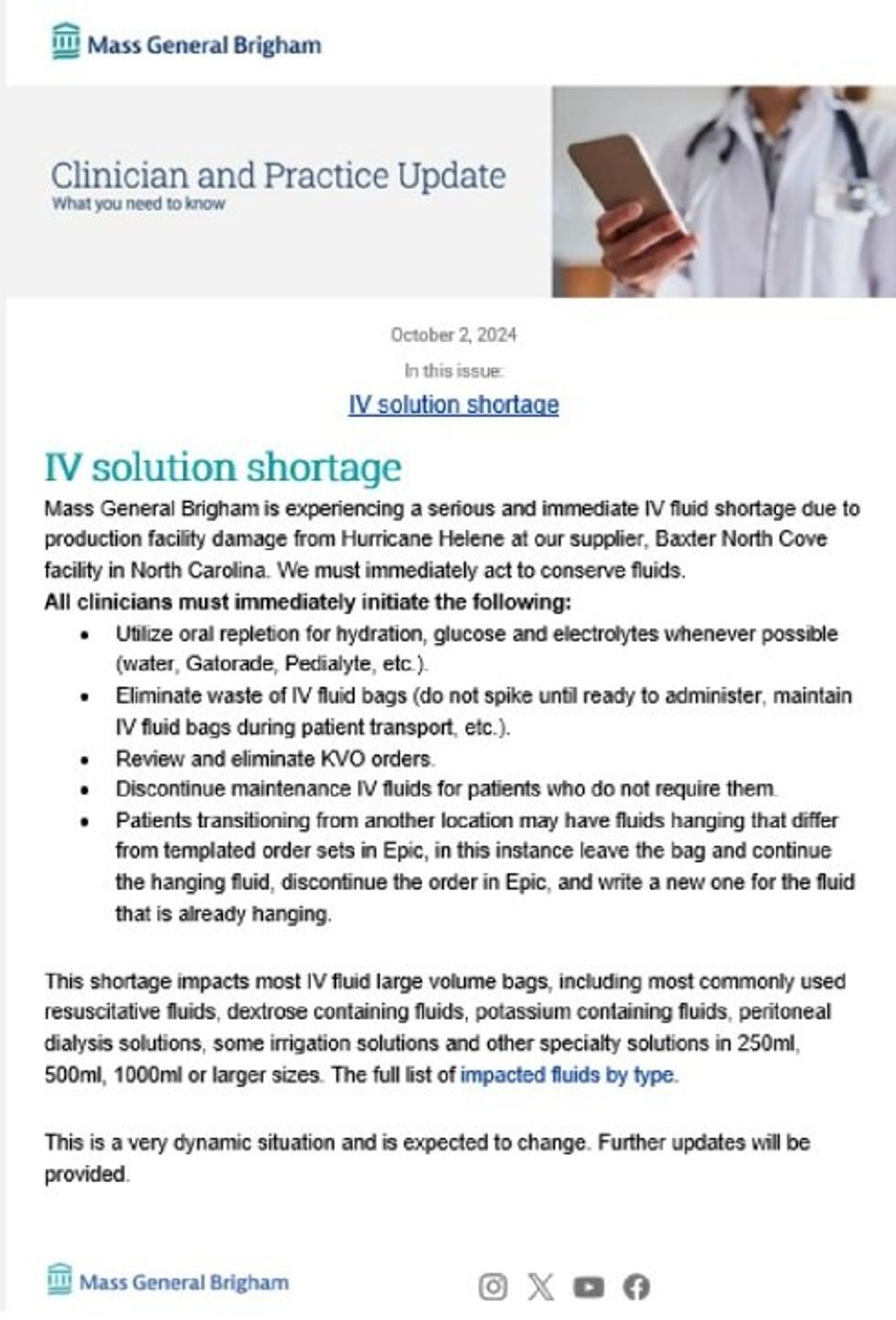
SDI Productions/Getty Images

'We can expect 40% of what we normally order.'
Hospitals across America are scrambling after damage to a supplier in North Carolina has jeopardized their inventory of IV fluids.
Baxter International, a factory that manufactures medical products in Marion, North Carolina, about 35 miles outside Asheville, was battered by Hurricane Helene. Muddy conditions, damaged bridges, flooding, and other concerns have forced the factory to shut down for the time being.
'If we get a big burn, we can blow through a ton of these fluids very quickly.'
"The safety of our employees, their families, and the communities in which we operate remains our utmost concern, and we are committed to helping ensure reliable supply of products to patients," said a statement from José "Joe" Almeida, chair, president, and chief executive officer at Baxter. "Remediation efforts are already underway, and we will spare no resource -- human or financial -- to resume production and help ensure patients and providers have the products they need."
According to CBS News, Baxter provides about 60% of the country's IV fluid bags, so the shutdown there has left hospitals from as far away as Massachusetts and Oregon implementing emergency procedures to deal with a possible shortfall of IV fluids.
A long-time medical professional at Mass General Brigham in Boston explained to Blaze News that an IV fluid shortage can impact patients with many different medical needs.
"Patients that are dehydrated, patients that can't eat, patients that can't swallow, patients that have had surgery, that have come in for surgery, patients that have come in for surgery where the surgery hasn't gone well, patients that are bleeding and need resuscitative fluids, trauma patients, burn patients, cancer patients, you know, it covers all the population," said the medical staff member who preferred not to be named.
"If we get a big burn, we can blow through a ton of these fluids very quickly."
Thus far, Mass General Brigham has managed to meet patient needs, the medical professional told Blaze News.
However, he also shared a screenshot of a memo, issued by the hospital on October 2, that makes the severity of the situation clear. The memo claims the hospital is experiencing "a serious and immediate IV fluid shortage" and demands that medical personnel "immediately act to conserve fluids."

Dr. Paul Biddinger, the chief preparedness and continuity officer at Mass General Brigham, admitted to CBS News that the hospital is enduring "one of the biggest shortages" in its history.
At a news conference on Friday, Biddinger claimed he expects MGB will continue to receive about 40% of the usual supply from Baxter.
Chris Laman, vice president of strategy for Columbia Memorial Hospital in Astoria, Oregon, told NPR a similar story.
"My hospital has been told we can expect 40% of what we normally order," Laman told the outlet in an email. "We are talking about having to limit elective surgeries."
In the meantime, manufacturers located well outside the path of Hurricane Helene and the subsequent flood zone are attempting to make up for the shortages. B. Braun told CBS News that it is "taking immediate steps to increase production at our pharmaceutical manufacturing sites in Irvine, California, and Daytona Beach, Florida, focusing on critical IV fluids."
Many experienced medical professionals have also already dealt with a similar shortage after Hurricane Maria brought a major IV fluid manufacturer in Puerto Rico to a halt in 2017.
"We have been informed that due to the devastating effects of Hurricane Helene, we will be receiving a reduced supply of IV fluids from Baxter International as they work to mitigate disruptions in their manufacturing operations. Having experienced similar challenges in the wake of Hurricane Maria in 2017, we continue to be mindful of how we manage the supply of these medications to ensure minimal impact on our patients. Hospital operations continue as normal and patient care remains unaffected," Biddinger said in a statement to Blaze News.
Editor's note: This article has been updated to include a statement from Dr. Paul Biddinger of Mass General Brigham sent to Blaze News after deadline.
Like Blaze News? Bypass the censors, sign up for our newsletters, and get stories like this direct to your inbox. Sign up here!